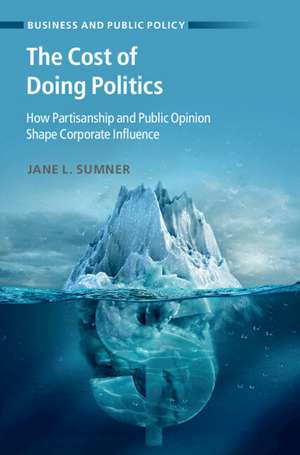The Cost of Doing Politics: How Partisanship and Public Opinion Shape Corporate Influence: Business and Public Policy
Autor Jane L. Sumneren Limba Engleză Hardback – 4 mai 2022
Din seria Business and Public Policy
-
 Preț: 231.44 lei
Preț: 231.44 lei -
 Preț: 274.93 lei
Preț: 274.93 lei - 11%
 Preț: 569.49 lei
Preț: 569.49 lei -
 Preț: 279.67 lei
Preț: 279.67 lei -
 Preț: 231.96 lei
Preț: 231.96 lei -
 Preț: 280.41 lei
Preț: 280.41 lei -
 Preț: 420.38 lei
Preț: 420.38 lei - 14%
 Preț: 681.88 lei
Preț: 681.88 lei -
 Preț: 247.43 lei
Preț: 247.43 lei -
 Preț: 295.88 lei
Preț: 295.88 lei -
 Preț: 279.29 lei
Preț: 279.29 lei -
 Preț: 278.50 lei
Preț: 278.50 lei -
 Preț: 281.91 lei
Preț: 281.91 lei - 11%
 Preț: 617.75 lei
Preț: 617.75 lei -
 Preț: 278.87 lei
Preț: 278.87 lei -
 Preț: 220.99 lei
Preț: 220.99 lei - 11%
 Preț: 588.70 lei
Preț: 588.70 lei -
 Preț: 233.48 lei
Preț: 233.48 lei - 32%
 Preț: 542.41 lei
Preț: 542.41 lei
Preț: 570.59 lei
Preț vechi: 641.11 lei
-11% Nou
Puncte Express: 856
Preț estimativ în valută:
109.23€ • 113.54$ • 90.57£
109.23€ • 113.54$ • 90.57£
Carte tipărită la comandă
Livrare economică 06-20 februarie 25
Preluare comenzi: 021 569.72.76
Specificații
ISBN-13: 9781009123259
ISBN-10: 1009123254
Pagini: 200
Dimensiuni: 157 x 235 x 17 mm
Greutate: 0.52 kg
Ediția:Nouă
Editura: Cambridge University Press
Colecția Cambridge University Press
Seria Business and Public Policy
Locul publicării:Cambridge, United Kingdom
ISBN-10: 1009123254
Pagini: 200
Dimensiuni: 157 x 235 x 17 mm
Greutate: 0.52 kg
Ediția:Nouă
Editura: Cambridge University Press
Colecția Cambridge University Press
Seria Business and Public Policy
Locul publicării:Cambridge, United Kingdom
Cuprins
1. Introduction; 2. Where does political influence come from?; 3. How does public opinion shape corporate political advocacy?; 4. Why does the public care about corporate political influence?; 5. Why do companies care about public opinion?; 6. Do companies try to avoid public backlash?; 7. So what and now what? Summaries and concluding thoughts; Bibliography; Appendix A: Interview methods; Appendix B: Chapter 4 study methodology and full results; Appendix C: Chapter 5 robustness checks; Appendix D: Chapter 6 robustness checks; Index.
Recenzii
'This book shows how the ever-present 'threat of public backlash' induces firms to obscure some lobbying-type actions aimed at political influence, to avoid some others altogether, and conversely intentionally to publicize a few others or at least undertake them in plain daylight without effort to hide. It convincingly establishes that 'public backlash' against firm political action (influence-seeking) is a form of political speech that strongly influences how, and how much, corporate political influence is exerted. Jane Lawrence Sumner's The Cost of Doing Politics is outstanding, and important, scholarship on the powerful role of popular action in mitigating problematic firm lobbying and government influence.' Robert J. Franzese, Jr, Department of Political Science, The University of Michigan, Ann Arbor
'Businesses want to influence policies, at the local, state and national levels. But they may want to do so discretely, away from the spotlight of consumers or activists. Using interviews, survey experiments, social media data and corporate filings, Sumner explores how U.S. firms choose among influence strategies, such as lobbying, campaign contributions and local philanthropy. In doing so, she offers insights into corporate political activity, corporate social responsibility and consumer activism.' Layna Mosley, Professor, Department of Politics, Princeton University
'Sumner's rigorous yet readable book makes two innovative claims: businesses pursue their interests at all levels of governments-local as well as state and federal-and they often avoid regulated campaign and lobbying spending precisely because it's easily seen and thus a potential source of public backlash. A major contribution to the study of corporate power.' Jacob Hacker, Stanley B. Resor Professor of Political Science, Yale University
'Businesses want to influence policies, at the local, state and national levels. But they may want to do so discretely, away from the spotlight of consumers or activists. Using interviews, survey experiments, social media data and corporate filings, Sumner explores how U.S. firms choose among influence strategies, such as lobbying, campaign contributions and local philanthropy. In doing so, she offers insights into corporate political activity, corporate social responsibility and consumer activism.' Layna Mosley, Professor, Department of Politics, Princeton University
'Sumner's rigorous yet readable book makes two innovative claims: businesses pursue their interests at all levels of governments-local as well as state and federal-and they often avoid regulated campaign and lobbying spending precisely because it's easily seen and thus a potential source of public backlash. A major contribution to the study of corporate power.' Jacob Hacker, Stanley B. Resor Professor of Political Science, Yale University
Notă biografică
Descriere
Reveals how and why corporate political influence remains largely invisible to the public eye.
